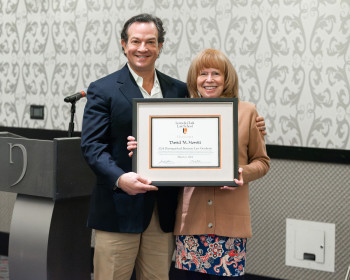Environmental Law Publishes Symposium Edition
Open gallery

Lewis and Clark’s Environmental Law, the nation’s oldest law review dedicated solely to environmental issues, released Volume 49, No. 3. This issue contains scholarship from select speakers who attended the spring Environmental Law Symposium, as well as a discussion of the use of the Administrative Procedure Act as an environmental law from Environmental Law’s prior editor-in-chief.
This edition of Environmental Law is in a tribute to Professor of Law Emeritus Bill Funk’s 36 years of dedicated teaching at Lewis & Clark Law School. Current Editor-in-Chief, Audrey Leonard, stated, “It is our hope that this issue honors Professor Funk’s contributions to the school, its students, and the Environmental, Natural Resources, and Energy Law program.”
The new edition features five articles from professors who participated in the spring symposium.
Professor Sidney Shapiro authored Law, Expertise and Rulemaking Legitimacy: Revisiting the Reformation, which examines the contribution that agency expertise makes to the legitimation of administrative law.
Professors Victor Flatt and Richard Zerbe authored Climate Change Common Law Nuisance Suits: A Legal-Efficiency Analysis, which provides an economic analysis that demonstrates how common law strict liability nuisance lawsuits for climate change damages would increase economic efficiency and provide an incentive for climate change mitigation innovation.
Professor Robin Kundis Craig authored Constitutional Environmental Law, or, the Constitutional Consequences of Insisting that the Environment is Everybody’s Business, which posits that environmental law is the result of Congress consciously deciding that environmental protection is everybody’s business - specifically from Congress’s decisions that states should participate in, rather than be preempted by, federal law, that private citizens and organizations should help enforce the statutes, and that private land and water rights are necessary components of national environmental protection, thereby invoking constitutional consequences.
Professor Bill Funk authored Is the Environmental Appeals Board Unconstitutional or Unlawful?, which discusses whether the Environmental Appeals Board is or unlawful.
Emeritus Dean James Huffman authored Judges, Bureaucrats and the Leviathan State: A Reply to Professor Funk (35 Years Later), which outlines an essay he published in 1984 titled “The Role of Court in the Implementation and Administration of Environmental Legislation,” Professor Funk’s published reply, “Alive and Well in the Leviathan State: A Reply to Professor Huffman,” and formulates his response to their 1984 positions.
The symposium edition of Environmental Law also includes two essays from professors.
Professor Peter L. Strauss authored Domesticating Guidance, which addresses aspects of the use of agency soft law documents generally discussed today under the rubric “guidance.”
Professor Craig N. Johnston authored Ensuring Compliance: Equitable Relief in the Face of Violations of Substantive Environmental Standards, where he considers limits on the discretion that courts possess when facing plaintiffs’ requests for injunctive relief after they have successfully established that defendants are violating substantive requirements under our environmental laws.
The issue also includes one comment from Environmental Law’s prior editor-in-chief and recent graduate of Lewis & Clark Law School.
Ross Stansbery ’19 authored The APA as an Environmental Law, which analyzes the APA’s requirement for a reasoned explanation and draws parallels between the Trump and Bush Administrations’ failures. The comment also provides strategies administrations can use under the APA for resilient environmental rulemaking and effectively reversing the rules of their predecessors, as well as strategies for litigants seeking to challenge an administration’s environmental policy reversal.
Law Communications is located in room 304 of Legal Research Center (LRC) on the law Campus.
MSC: 51
email jasbury@lclark.edu
voice 503-768-6605
Cell: 626-676-7923
Assistant Dean,
Communications and External Relations, Law School
Judy Asbury
Law Communications
Lewis & Clark Law School
10101 S. Terwilliger Boulevard MSC 51
Portland OR 97219

